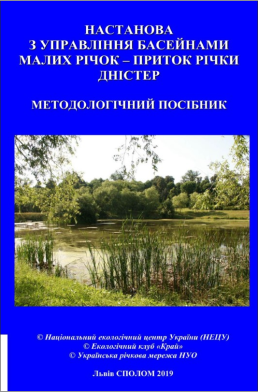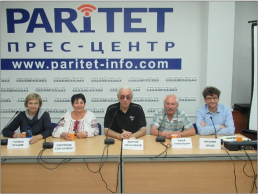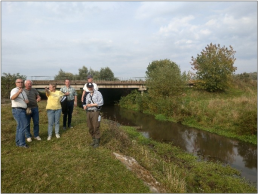UfU Information | Issue 4 – December 2021 | Department of Environmental Law & Participation
Everything in flux in Ukraine
A common path to near-natural small bodies of water
A new association agreement
September 2017 – The Association Agreement between the European Union and Ukraine enters into full force. An association agreement is a treaty under international law through which states enter into various obligations with each other, usually relating to trade. The removal of trade barriers, cultural exchange and increased political dialog are intended to ensure joint cooperation and increase the prosperity of both contracting parties.
The European Union has already concluded numerous such agreements, including as a precursor to EU accession for certain countries. Negotiations were also held with Ukraine and an association agreement was signed in 2014. The EU and Ukraine are thus not only moving closer together economically through a free trade zone. On the basis of deeper political integration, Ukraine would also like to adopt some relevant EU laws and directives in order to emphasize common values. This should apply to the areas of environmental protection, social development, transport, consumer protection and several others.
The European Water Framework Directive (WFD)
In terms of environmental protection, the agreement means that Ukraine will adopt various EU environmental directives and implement them in its own country. The support of the European Union is also being relied upon. NGOs such as the UfU are often involved.
Ukraine is to implement six EU directives in the area of water policy. One of these is the European Water Framework Directive (WFD). The WFD focuses on ecologically oriented, holistic water protection, regulates the management of water bodies and aims to bring all water bodies to a good or very good ecological status. In other words, the association agreement commits Ukraine to improving the quality of its own waters and bringing them into an ecologically healthy state. Not an easy task.
The challenge
The implementation of European directives should not be underestimated. Elsewhere in this magazine, we report on the EU’s complex technocratic rules on access to justice. The WFD is a no less complex directive, which requires precise knowledge of the legal material and experience in its implementation.
The Ukrainian authorities are therefore faced with the challenge of integrating these European directives into their own administration. In addition, the administration in Ukraine has been carrying out a comprehensive decentralization reform since 2014, which assigns new powers to municipal levels and has not yet been completed. In this respect, Ukrainian authorities currently have the difficult task of restructuring their own administration and implementing complex EU directives at the same time. The implementation of the Water Framework Directive itself, as well as the large number of preparatory activities – such as data collection – are therefore difficult to realize without external support.
In Ukraine, UfU is providing the necessary support for local decision-makers in Ukrainian authorities and civil society in the project “Capacity building for water management at local level in selected regions of Ukraine” funded by the Federal Ministry for the Environment, Nature Conservation and Nuclear Safety. In the long term, the project aims to create the capacity for independent water management in accordance with EU requirements.
Small and large bodies of water
Small bodies of water are often neglected when implementing such directives, as experience in Moldova has shown. In Ukraine, the authorities are also focusing mostly on the large main water bodies and river catchment areas and are trying to implement the directive there. This is not only because small bodies of water are less well known and have a lower economic benefit, but also because the implementation of such directives on small bodies of water is sometimes confronted with completely different problems than on large ones. The main problems of smaller watercourses in the project region are that they are particularly vulnerable to climate change and also suffer from wastewater discharges, illegal landfills and unsustainable land use. For example, excessive deforestation or agricultural activities exacerbate the negative impacts on rivers, in particular drinking water shortages and crop losses during periods of drought or water erosion during heavy rainfall events.
However, it is important to take these small bodies of water into account when implementing water protection measures. As they supply the large rivers with water, their condition determines that of the large rivers. They also have a number of important functions: They are habitats and retreats for flora and fauna, leisure and recreational areas for people, they have a positive effect on the microclimate, structure and connect landscapes and biotopes and form natural flood retention areas. Taken as a whole, they therefore have a direct impact on the status and living conditions in the entire river network.
The project
In 2019, UfU launched the new project Capacity Building for Water Management at Local Level in selected regions of Ukraine together with its partners Eco-Tiras, Ecological Club Kray and Black Sea Women’s Club.
Develop phase 1 basics
In Phase 1, UfU and its Ukrainian partners focused on the development of a guideline on the management of small river basin districts, which is aimed at local authorities, civil society and the interested public. On the one hand, it provides an overview of the basics of water management under the WFD, the initial situation in Ukraine and the legal responsibilities under Ukrainian water law and the WFD. On the other hand, the guideline provides concrete recommendations for the management of small river basin districts in the target regions and presents best practice examples from Ukraine. In consultation with Ukrainian decision-makers, one focus of the guideline was on recommendations for the establishment of water management councils, i.e. advisory and coordinating bodies in the area of individual (sub)basins, for the development and adoption of recommendations for optimal water management.
Phase 2 – Biological engineering measures
The second phase of the project began at the end of 2020. Based on the needs expressed during the project workshops in Phase 1, UfU is concentrating in this phase primarily on recommendations for near-natural measures that can be implemented directly on rivers at low cost and demonstrably improve quality. These include, above all, biological engineering measures. These are near-natural construction methods with predominantly naturally grown materials. In the specific case of watercourses, for example, these are measures that give artificially straightened rivers a naturally meandering shape again. Another example is the targeted placement of living and dead plant material for bank stabilization. Such measures are a tool for achieving the good ecological status of water bodies as required by the WFD. A key element in achieving this goal is the restoration of (potentially) natural watercourse structures by means of near-natural watercourse development, for which engineering biology is ideal.
The project will therefore hold a series of online and on-site workshops in Ukraine on such measures and produce a handout on bioengineering construction methods for watercourse maintenance.
The project will be officially concluded in spring 2022 with a final workshop and a participatory practical workshop on the implementation of an engineering biology measure on a small river in Ukraine.
Significance of the project
Water protection is an essential part of environmental protection. Biodiversity in watercourses is significantly influenced by water quality and quantity. At the same time, the water bodies ensure the supply of drinking water. As the quality of these watercourses declines, the amount of treatment required for clean drinking water increases. In Germany, too, the high nitrate content, for example, pollutes our waters and has to be removed from the water using energy-intensive processes before it becomes drinkable.
The project also promotes cross-border cooperation. Some of Ukraine’s rivers flow into the Danube, the Vistula and the Baltic Sea. It is in everyone’s common interest to protect watercourses, as they do not stop at national borders.
Guidelines for the management of small watercourses in Ukraine

UfU Managing Director Dr. Michael Zschiesche (right) at a press conference to present the guidelines from Phase 1

On-site river inspection with the Ukrainian partners



